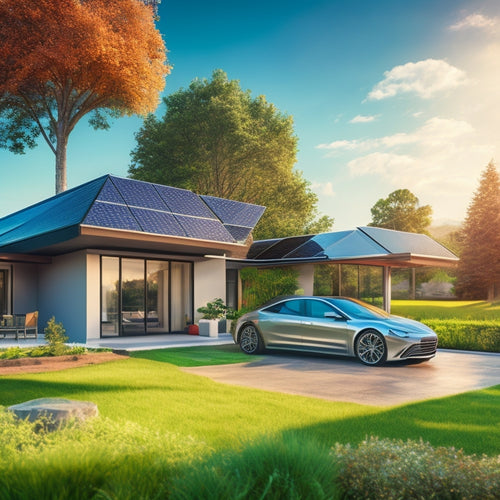
What's the Most Efficient Solar Package for Your Home
Share
To create the most effective solar package for your home, start by understanding your daily energy needs and conducting an energy audit to identify areas of inefficiency. Then, assess your roof's solar potential by evaluating its orientation, shading, and condition. Choose high-efficiency solar panels with advanced technologies and a long-lasting warranty. Select a compatible inverter and consider a battery backup system for reliable power during outages. Properly maintain and monitor your system to guarantee peak performance. By following these steps, you'll be well on your way to reducing your energy bills and maximizing your solar investment – and there's more to investigate in creating the perfect package for your home.
Key Takeaways
- Assess your daily energy consumption and conduct an energy audit to determine the ideal solar panel system size for your home.
- Choose solar panels with high energy efficiency ratings (>20%) and durable materials (tempered glass, anodized aluminum) for optimal performance.
- Select an inverter with high DC-to-AC conversion efficiency and ensure proper placement in a well-ventilated area for longevity.
- Consider a battery backup system with sufficient storage capacity to sustain power during grid outages and low sunlight periods.
- Regularly monitor solar panel performance and schedule routine maintenance checks to identify and address potential issues for optimal efficiency.
Understanding Your Energy Needs
Determining your energy needs is the first crucial step in designing an efficient solar package for your home.
You'll want to calculate how much energy your home consumes on a daily basis. This involves tracking your energy usage patterns, including the appliances and devices you use, their wattage, and the number of hours they're used daily. You can do this by reviewing your past electricity bills or conducting an energy audit.
An energy audit helps identify areas of energy inefficiency in your home, providing useful observations to optimize your energy usage. By understanding your energy needs, you can determine the size of the solar panel system required to meet your energy demands.
Additionally, knowing your energy needs helps you take advantage of solar incentives, such as net metering and tax credits, which can greatly reduce the cost of your solar package.
Assessing Your Roof's Solar Potential
Solar readiness beckons as you shift your focus to the rooftop, where the viability of your solar package hangs in the balance.
You're about to determine if your roof is solar-ready, and that's essential because it directly affects the performance of your solar panel system.
Start by evaluating your roof's orientation. Is it south-facing, which is ideal, or does it receive morning or afternoon sun? A south-facing roof receives the most sunlight throughout the day, making it the most efficient.
Next, conduct a shading analysis to identify any obstructions that might cast shadows on your roof. Trees, chimneys, and neighboring buildings can all reduce the amount of sunlight your solar panels receive.
Consider the time of day and year when evaluating shading, as it can vary considerably.
Choosing the Right Solar Panels
When selecting solar panels for your home, you'll want to evaluate two key factors: panel efficiency and durability with warranties.
You'll need to determine how efficiently a panel converts sunlight into electricity, as this directly impacts your energy savings.
Additionally, you'll want to assess the panel's durability and warranty offered by the manufacturer to guarantee long-term performance and protection.
Panel Efficiency Matters
Your energy harvest relies on the quality of your solar panels, and panel efficiency is a crucial factor in maximizing your energy output. When selecting solar panels, it's important to take into account the energy efficiency ratings, which indicate how well they convert sunlight into electricity.
Look for panels with high energy efficiency ratings, typically above 20%. This guarantees you're generating the most power possible from the available sunlight.
Solar panel technology has progressed considerably, and modern panels boast improved efficiency. For instance, bifacial panels can capture energy from both the front and back sides, increasing overall energy output.
Similarly, high-efficiency panels with half-cut cells or multi-busbar designs can enhance energy production. When evaluating solar panels, take into account the type of technology used and its corresponding energy efficiency rating.
Durability and Warranties
High-quality solar panels are only as good as their ability to withstand the elements and perform consistently over time. When choosing the right solar panels for your home, you'll want to take into account the durability and warranties offered by different manufacturers.
Look for panels made from high-quality material types, such as tempered glass and anodized aluminum, which can withstand harsh weather conditions. Lifespan expectations vary, but top-tier panels typically come with a 25-year warranty and are designed to last for 30 years or more.
Environmental impact is also an important factor, as you'll want to verify that your solar panels are built to minimize their ecological footprint.
Maintenance requirements should be minimal, with easy cleaning and inspection processes. Performance guarantees are vital, providing assurance that your panels will meet their advertised energy output.
Installation standards should meet local building codes, and weather resistance should be a top priority. Finally, warranty coverage should include extensive protection against defects, performance issues, and environmental degradation.
Inverter Selection and Configuration
Several key factors come into play when selecting the right inverter for your solar package. As you examine your options, you'll want to take into account the following:
-
Inverter types: String inverters, microinverters, and power optimizers each have their own strengths and weaknesses. String inverters are the most common, but microinverters provide more flexibility and monitoring capabilities.
-
Inverter placement: Where you place your inverter can impact its performance and longevity. You'll want to verify it's in a well-ventilated area, protected from extreme temperatures and moisture.
-
DC-to-AC conversion efficiency: Look for an inverter with a high efficiency rating to minimize energy loss during conversion.
When configuring your inverter, you'll also need to take into account the size of your solar array, the type of electrical panel you have, and any local electrical codes or regulations.
Battery Backup and Energy Storage
You'll want to take into account a battery backup system to guarantee your home remains powered during grid outages.
This setup will provide you with a reliable source of energy when you need it most, and its energy storage capacity will be a vital factor in determining how long you can sustain yourself off-grid.
Power Outage Protection
About 70% of American households experience a power outage each year, often leaving them in the dark for hours or even days.
When the grid goes down, you're left scrambling for emergency preparedness solutions. That's where power outage protection comes in - an essential aspect of your solar package.
With a battery backup system, you can guarantee your home remains powered during blackouts.
Here are three key benefits:
-
Reliable backup power: A battery backup system kicks in automatically during an outage, providing you with a seamless shift to backup power.
-
Extended autonomy: With a battery backup system, you can enjoy extended periods of autonomy, keeping your essential appliances running for hours or even days.
-
Better blackout solutions: By integrating energy storage with your solar panel system, you can enjoy an all-encompassing blackout solution that keeps your home powered and comfortable.
Energy Storage Capacity
Frequently, homeowners investing in solar packages overlook a crucial aspect: energy storage capacity. You need to take into account how much energy you'll require during power outages or when the grid is down. Energy storage capacity, also known as battery backup, guarantees you can store excess energy generated by your solar panels during the day for use at night or during outages.
When selecting a battery, reflect on the battery lifespan, which typically ranges from 5 to 15 years. You'll want a battery that can handle your solar load, meaning it can store the excess energy your panels produce during peak hours. A battery with a higher capacity will provide more power during outages, but it also increases the upfront cost.
You should also contemplate the type of battery chemistry, such as lithium-ion or lead-acid, and the depth of discharge (DOD), which affects the battery's lifespan. A higher DOD means the battery can be drained further, but it may reduce its lifespan.
System Monitoring and Maintenance
Your solar panel system's performance relies heavily on regular system monitoring and maintenance to guarantee maximum energy production and prolong its lifespan.
This confirms that your system operates at ideal levels, reducing the risk of energy losses and potential system failures.
To maintain your system's performance, follow these essential maintenance tips:
-
Regularly inspect your system: Check for signs of damage, wear, or tear on your solar panels, inverters, and mounting systems.
-
Monitor system performance data: Keep track of your system's energy production and consumption patterns to identify potential issues early on.
-
Schedule professional maintenance: Have a certified solar technician inspect and maintain your system annually to verify it operates at peak performance.
Evaluating Solar Panel Quality
When selecting a solar panel system, evaluating the quality of the solar panels themselves is essential. You need to guarantee that your system will generate the maximum amount of power possible while withstanding various environmental conditions.
To do this, you'll want to assess the solar panel materials used. Look for high-efficiency panels with durable frames and tempered glass that can resist extreme temperatures, wind, and weathering. In addition, consider the type of photovoltaic (PV) cells used, such as monocrystalline or polycrystalline silicon, as they affect the panel's efficiency and lifespan.
You should also investigate the installation techniques used by the solar provider. A well-installed system guarantees that your panels are securely fastened, properly angled, and efficiently connected to maximize energy production.
Moreover, a reputable installer will guarantee that your system meets local building codes and electrical standards. By evaluating these factors, you can confidently choose a high-quality solar panel system that will provide reliable power for years to come.
Pricing and Financing Options
Three key factors influence the overall cost of a solar panel system: equipment, installation, and financing.
You'll need to assess these components to determine the best pricing and financing options for your home.
Top 3 Financing Options to Evaluate:
-
Government Incentives: Take advantage of tax credits and rebates offered by the government to reduce your upfront costs.
-
Leasing Options: Investigate leasing options that allow you to use the solar panel system for a fixed monthly fee, often with little to no upfront costs.
-
Loan Programs: Look into loan programs that offer favorable financing terms, allowing you to spread the cost of the system over several years.
When evaluating financing options, think about the long-term savings and benefits of going solar.
While upfront costs may seem overwhelming, government incentives, leasing options, and loan programs can help make solar energy more accessible.
Certifications and Warranty Considerations
Solar panel systems are complex products requiring careful evaluation of their certifications and warranty considerations to guarantee a safe, reliable, and efficient installation.
When shopping for a solar panel system, you'll encounter various certification types, including UL (Underwriters Laboratories) and IEC (International Electrotechnical Commission) certifications. These certifications confirm the system meets safety and performance standards. You should also look for certifications from reputable third-party organizations, such as the North American Board of Certified Energy Practitioners (NABCEP).
In addition to certifications, warranty terms are essential. A thorough warranty should cover the system's components, including panels, inverters, and mounting hardware, for at least 25 years.
You should also consider the warranty's coverage period, as well as the manufacturer's reputation for honoring warranty claims. A strong warranty provides peace of mind and protects your investment.
Be sure to carefully review the warranty terms and conditions to verify you're getting a reliable and efficient solar panel system that meets your energy needs.
Frequently Asked Questions
Can I Install Solar Panels on a Rented Property?
You'll need to review your rental agreements before installing solar panels, as some contracts may not allow modifications. If permitted, you can investigate solar panel options, like community solar programs or portable panels, that don't require permanent installation.
How Do I Ensure My System Meets Local Building Codes?
You'll need to research local regulations and obtain necessary building permits to guarantee your solar system meets codes. Verify with your local government to determine required permits and inspections, and work with a licensed installer to steer through the process.
Are There Any Solar Panel Recycling Options Available?
You'll be shocked to know that only 10% of solar panels are currently recycled, but you can do your part! As solar panels have a 25-year lifespan, you can look into recycling programs that responsibly repurpose materials, ensuring a sustainable energy future.
Can I Use Solar Power to Charge My Electric Vehicle?
You can utilize solar power to charge your electric vehicle, maximizing EV benefits like reduced emissions and lower operating costs. Install a dedicated solar charging station, and you'll be driving on sunshine in no time, tracking your energy independence with precision.
Do Solar Panels Work During Power Outages?
You're wondering if solar panels work during power outages. Typically, they don't, as they're grid-tied and shut down for safety reasons. However, you can invest in backup power systems, like battery storage, to guarantee continuous solar panel functionality when the grid goes down.
Related Posts
-

What Solar Panels Work Best With EVS Online?
When shopping for solar panels online to power your electric vehicle, look for high-efficiency models that can withst...
-

Why You Need a Phone Mount for Navigation
When you're on the road, a reliable phone mount is not just a convenience, it's a safety necessity that helps you mai...
-

Top 10 DIY Conversion Kit Reviews and Tips
You're taking the first step towards electrifying your ride, and with the right DIY conversion kit, you'll be cruisin...


